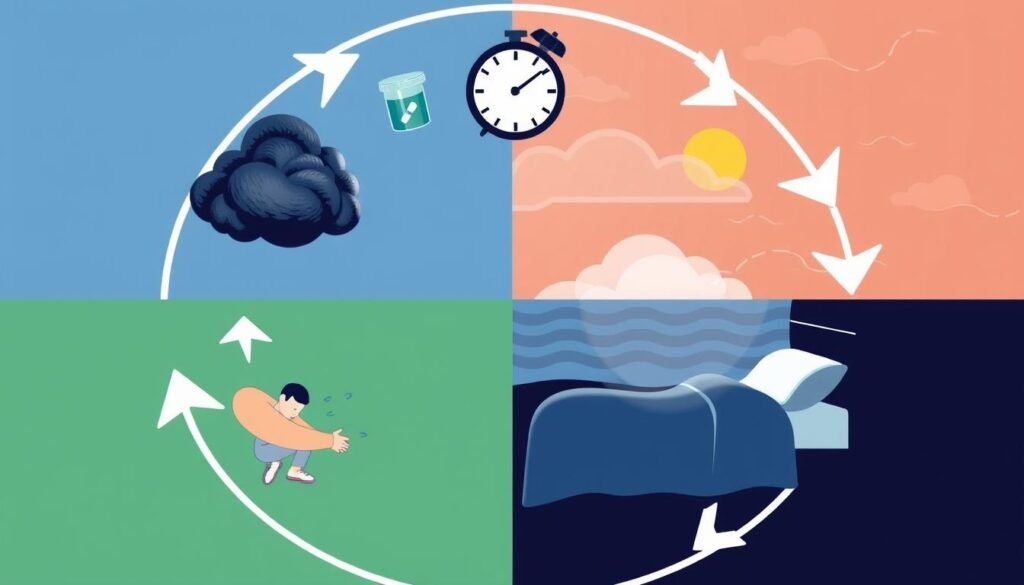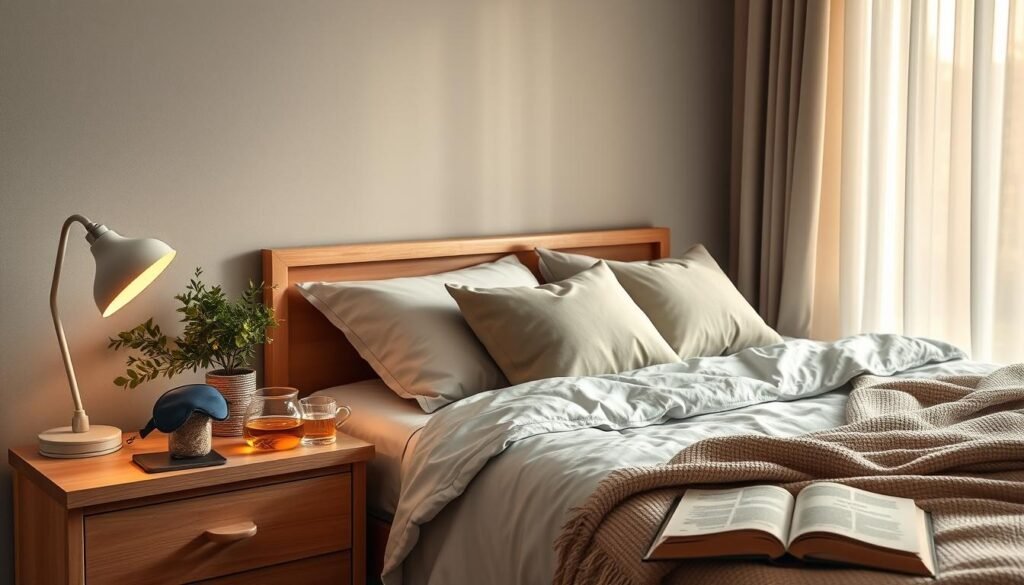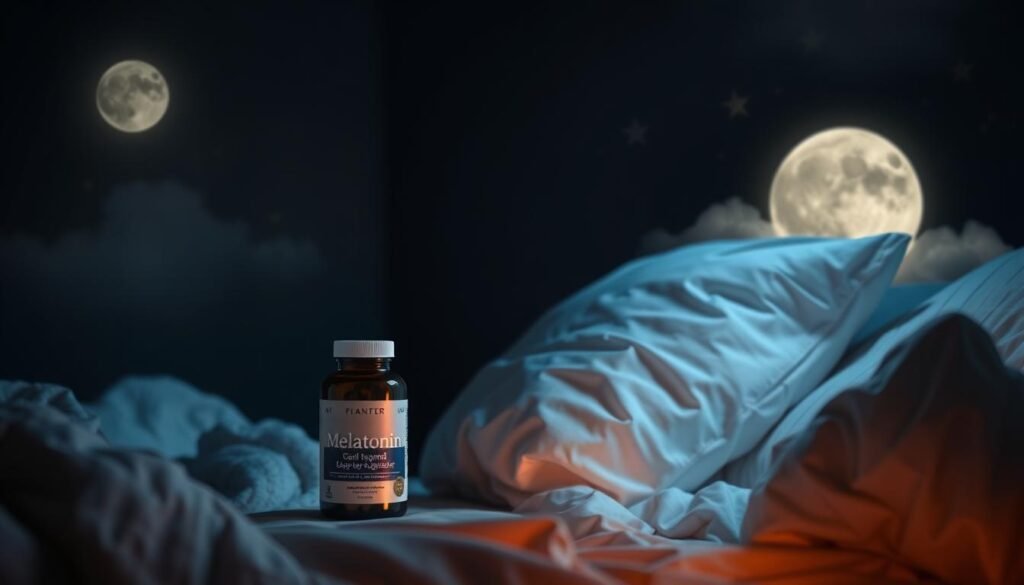Over half of migraine sufferers have trouble sleeping, says the American Migraine Foundation. This issue is more than just losing sleep. It leads to a cycle where sleep problems and migraines feed off each other.
Finding a way to treat this dual issue is crucial. Digital cognitive behavioral therapy is being looked into. It focuses on improving sleep and reducing migraines by tackling the root causes. For more details, see this research.
Key Takeaways
- Over 50% of migraine sufferers also experience sleep disturbances.
- Insomnia significantly increases the risk of migraine headaches.
- Effective treatments, including digital CBT, are being researched for better sleep quality and migraine relief.
- Morning migraines are linked to poor sleep quality, with a 22% increased chance of attacks when sleep is disrupted.
- Improving sleep hygiene can be crucial for those suffering from migraines and insomnia.
Understanding Migraines and Their Impact on Sleep
Migraines trouble millions around the world with terrible headaches. This condition affects everyday life, especially sleep. Seeing how migraines and sleep problems are linked shows we must tackle both for better health.
What Are Migraines?
Migraines mean experiencing severe, pounding headaches. These often come with nausea, vomiting, and a dislike of light and sound. Being the second most common neurological issue, migraines affect about one billion people. Women are three times more likely to suffer from migraines. The highest occurrence is between 35 and 39 years of age. Migraines disrupt daily life and are worse with sleep issues.
How Migraines Affect Sleep Patterns
Poor sleep worsens migraine problems. Those with migraines struggle more with sleeping well. About 75% of migraines strike during sleep or right when waking up. This makes sleep less refreshing for migraine sufferers.
| Impact on Sleep | Details |
|---|---|
| Sleep Quality | Migraine patients report poorer sleep quality than non-sufferers. |
| Insomnia Prevalence | 25.9% of migraine patients experience insomnia. |
| Episodes | 75% of attacks occur during sleep or upon waking. |
| Increased Risk | Odds ratio of 1.7 for insomnia with migraine presence; 2.1 for those with significant migraine days. |
It’s vital to understand how migraines and sleep affect each other. Not sleeping well can make migraines happen more often. Treating migraines well means considering sleep quality too. This helps improve overall health.
The Vicious Cycle: Migraines and Insomnia
The link between migraines and sleep is complex. Many people find this cycle hard to break. Insomnia can make migraines worse, causing a lot of pain. To get better, it’s key to understand how these issues are connected.
How Poor Sleep Triggers Migraines
Not sleeping well is a big reason people get migraines. Studies show that if you have insomnia, you’re more likely to get migraines. Bad sleep affects your body’s clock and sleep quality, making you more prone to migraines. Knowing how sleep problems can cause migraines highlights the need for a good sleep schedule.
Insomnia as a Common Symptom of Migraines
Many say insomnia happens with migraines. Trying to sleep with a migraine can mess up your sleep even more. This shows how important it is to treat insomnia to help with migraines. Finding the right treatment can help you sleep better and have fewer migraines.

Identifying the Symptoms of Migraines at Night
Migraines can disrupt not only your daily activities but also your sleep. It’s crucial for those suffering to recognize symptoms of nighttime migraines. These can include severe headaches, nausea, and a significant increase in sensitivity to light and sound. It’s important to understand the differences between nighttime migraines and hypnic headaches to manage them better.
Recognizing Migraine Symptoms During Sleep
Nighttime migraines can make it hard to get good rest. Common symptoms include:
- Intense headache pain
- Nausea
- Increased sensitivity to light
- Heightened sensitivity to sound
These can wake you up, affecting your health and how you function throughout the day. Recognizing these signs during sleep helps sufferers find timely help.
Determining If You’re Experiencing Nighttime Migraines or Hypnic Headaches
It’s essential to tell the difference between nighttime migraines and hypnic headaches to treat them right. Hypnic headaches wake older adults from sleep with head pain. Nighttime migraines, however, can happen unexpectedly at any age.
The traits of both help identify the type of migraine:
| Symptoms | Nighttime Migraines | Hypnic Headaches |
|---|---|---|
| Timing | Can occur anytime during the night | Wakes patient from sleep |
| Common Symptoms | Severe headache, nausea, sensitivity to light | Headache typically less severe |
| Duration | Can last several hours to days | Shorter duration, typically ending soon after waking |
Understanding the differences is key to seeking the right treatment. Recognizing symptoms at night can greatly improve comfort and management of migraines.
Migraine Insomnia Treatment Options
Finding the right migraine insomnia treatment is key for people dealing with both issues. Many methods combine behavioral strategies with medicines. These help tackle both problems together.
Cognitive Behavioral Therapy for Insomnia (CBT-I)
Cognitive Behavioral Therapy for Insomnia (CBT-I) is great for those with insomnia from migraines. It changes negative sleep thoughts and actions, improving sleep. Research shows CBT-I works as well as pills, without dependency risks. It usually needs 6 to 8 personalized sessions.
Medications for Migraines and Sleep
There are medicines for sleep and migraines too. While some drugs like benzodiazepines help quickly, they can lead to dependency. Nonbenzodiazepines, like eszopiclone, zaleplon, and zolpidem, are effective with fewer side effects. Combining CBT-I with the right medications can help a lot. Methods like stimulus control and sleep restriction also cut migraine frequency. More research on this is found here.
| Treatment Option | Effectiveness | Side Effects |
|---|---|---|
| CBT-I | High; long-lasting benefits | Minimal to none |
| Benzodiazepines | Effective for immediate relief | Dependency risk, fatigue |
| Nonbenzodiazepines | Effective, lower dependency risk | Mild side effects possible |
| Over-the-Counter Sleep Aids | Variable; situational use | Can lead to tolerance |
Natural Remedies for Migraine Relief
Many people with migraines look for natural remedies for migraines. They want to ease their symptoms without the side effects of regular medicines. Acupuncture is one popular option because of its effectiveness. Making certain lifestyle changes also greatly lowers how often and how severe migraine attacks are.
Acupuncture for Migraines
Acupuncture is becoming a popular choice for those with migraines. A study in 2020 showed that 20 acupuncture sessions led to fewer migraines. Unlike sham acupuncture, real acupuncture also helps with stress, a big cause of migraines. More than 80% of people with migraines say stress triggers their symptoms. So, acupuncture could be a big help in treating them.
Benefits of Routine and Lifestyle Changes
Keeping a regular schedule is important in migraine management. Exercise can lessen migraine severity. In fact, staying active could cut down on migraine attacks by 30%. Another important factor is drinking enough water. One-third of people affected by migraines say not drinking enough water triggers them. Staying hydrated can really help reduce migraine chances.
Mindfulness practices like yoga and meditation are also good for managing migraines. They help lower stress and improve overall health. Using acupuncture and making lifestyle switches can create a strong plan. This plan fights migraines and boosts life quality.
Practicing Good Sleep Hygiene
Good sleep hygiene is key in managing migraines and boosting overall health. Making your sleeping area relaxing helps you sleep better. Small changes can greatly improve how well you sleep and reduce headaches.
Creating a Sleep-Inducing Environment
Create a calm sleep environment for better rest. Here are some tips:
- Use blackout curtains to keep the room dark.
- Use earplugs or white noise machines to cut down noise.
- Keep your room at a comfortable temperature for sleeping.
- Stay away from screens before bed to avoid blue light.
Using your bedroom just for sleep improves its vibe for rest. Adding these steps to your night routine can make your sleep better. This could also help lower the chance of migraines.
Structuring Your Sleep Schedule
Keeping a regular sleep schedule helps your body’s clock stay on track. Sleeping and waking up at the same times every day helps you fall asleep faster. It also improves sleep quality. Try these ideas:
- Stick to a sleep schedule of 7 to 9 hours each night.
- Avoid big meals, alcohol, and caffeine near bedtime.
- Keep naps short and avoid them late in the day.
These habits don’t just promote good sleep hygiene; they also make migraines less likely. Studies show that certain psychological methods can better sleep quality. These methods are especially useful for those with frequent headaches. For further details on mental strategies for better sleep and fewer headaches, read this study.

Relaxation Techniques to Combat Migraines
Adding relaxation methods to your daily life can lessen the impact of migraines. Stress often triggers these painful headaches. That’s why it’s crucial to find ways to relax. Using techniques like breathing exercises can lower stress. This helps keep your mind calm and can lead to fewer migraines.
Breathing Exercises for Stress Relief
Breathing exercises are great for reducing stress and helping you relax. They involve taking slow breaths to decrease your heart rate and calm your nerves. Doing these exercises regularly can:
- Boost oxygen flow in your body
- Lower anxiety and tension
- Give you more control during migraine attacks
Practicing these exercises every day can improve your mental state. This is especially true when paired with mindfulness against migraines.
Mindfulness and Meditation Practices
Mindfulness and meditation bring tranquility and clear thinking, important for those with migraines. Daily mindfulness can help you understand what triggers your headaches. Try techniques like guided meditation or focusing on your breath to fight off migraines. Benefits include:
- Improved emotional health
- Better handling of stress
- Greater knowledge of what triggers migraines
Using mindfulness daily can greatly help in managing migraines. It helps create a calm mental and physical space.
Exploring Melatonin Supplements
Melatonin supplements are becoming popular for improving sleep. They come from the pineal gland and help control our sleep and wake cycles. People with migraines also find them helpful, as melatonin has several benefits.
How Melatonin Can Help with Sleep Quality
Melatonin can make a big difference for those with migraines, helping them sleep better. Let’s look at how it works:
- Immediate-release melatonin, often taken in 3 mg doses, is good for preventing migraines.
- Extended-release melatonin might work even at 4 mg, according to some research.
- Melatonin fights inflammation and might affect substances that cause migraines.
- People taking 3 mg of immediate-release melatonin felt better than those who didn’t.
- In some studies, more than half of the people using melatonin had fewer headaches.
Potential Risks and Considerations
Melatonin is usually safe, but it’s important to use it wisely. Consider these points:
- Taking too much melatonin can have different outcomes, so watch how much you use.
- Melatonin might change how certain medicines work, including blood thinners and sedatives. It’s best to talk to a doctor first.
- Using melatonin all the time might make your body make less of it. Taking breaks can help.
- For the best results, take melatonin 1 to 2 hours before going to bed.

Knowing the pros and cons of melatonin can help those with migraines choose wisely. This can lead to better health and a better life.
| Dosage | Efficacy | Risks |
|---|---|---|
| 3 mg (Immediate-release) | Effective for migraine prophylaxis | Potential interaction with medications |
| 25 mg (Agomelatine) | Observed benefits in studies | Higher doses may cause side effects |
| 4 mg (Prolonged-release) | Noted efficacy in observational studies | May reduce natural production with continuous use |
The Benefits of a Digital Detox for Insomnia and Migraines
Going through a digital detox can really help those who have trouble sleeping or with migraines. Cutting down on screen time can lead to a better sleep and health. Technology use messes with our sleep cycle and causes health problems.
Reducing Screen Time Before Bed
Cutting down screen time before sleeping is key to better rest. Experts recommend less screen use an hour before bed to boost melatonin. This helps the brain settle down for sleep. Studies show even reducing screen time by two hours makes a big difference for sleep.
Impact of Technology on Sleep Quality
The link between technology and sleep is complex. About 61% of people feel addicted to the internet and screens. This addiction increases insomnia in 10-30% of adults. Using smartphones a lot can cause anxiety and harm self-esteem, hurting sleep. Also, digital eye strain makes 50-90% of computer users feel tired and uncomfortable.
Disconnecting from digital devices improves mental health and lowers stress for many. A digital detox also helps with focus and strengthens personal relationships. It connects us more with our surroundings. Managing screen time is crucial to beat technology’s negative effects on sleep.
| Effects of Screen Time | Health Outcomes |
|---|---|
| Increased Anxiety Levels | 40% increase from excessive use |
| Reduced Sleep Quality | Up to 30% experiencing insomnia |
| Greater Digital Eye Strain | Affects 50-90% of users |
| Stressed Relationships | 45% feel relationships suffer |
| Improved Mental Clarity | Mindfulness practices increase by 20% |
Consulting a Medical Professional for Chronic Migraines
Living with chronic migraines is tough. It’s a cycle of pain that’s hard to break. Getting help from medical professionals is key. They create treatment plans just for you. Knowing when to get help can change your journey to feeling better.
When to Seek Medical Help
If you get headaches a lot or they’re really bad, it’s time to see a doctor. Here’s when you should get help:
- Headaches occur more days of the month than not.
- Symptoms worsen or disrupt daily life.
- Over-the-counter medications fail to provide relief.
- Headaches last longer than 72 hours.
Finding the Right Specialist
Finding the right doctor for migraines is important. Neurologists and headache specialists are usually the best choices. Look for professionals who:
- Have experience in treating chronic migraine cases.
- Utilize a combination of behavioral interventions and medications.
- Offer a comprehensive approach to headache management.
Conclusion
The link between migraines and sleep problems is crucial for people who often suffer from them. For effective treatment, it’s important to tackle both sleep and migraine issues together. Research shows that bad sleep can trigger more headaches. This highlights the need for a plan that looks at both aspects.
Treating insomnia with cognitive behavioral therapy is part of a good treatment plan. This approach can make sleep better and reduce the number of migraines. Natural solutions and changing daily habits are also key for better sleep. Making a bedtime routine and a good sleeping space is important, studies say. Trying these steps with expert advice can help improve sleep and lessen headaches.
Psychological therapies are proving to be effective in handling migraines. Getting good sleep can become a reality with the right treatments and lifestyle changes. This leads to a life with fewer headaches. For more info on treating insomnia and its effect on migraines, check out these resources here and here.